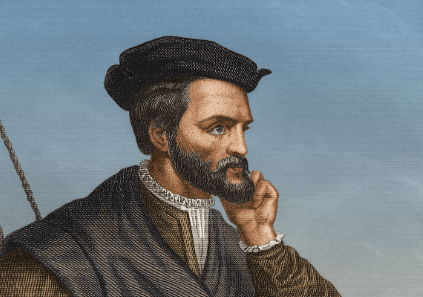Portrait:_Xjbnu7o5y0= Jacques Cartier

Jacques Cartier, a seminal figure in the age of exploration, embarked on three pivotal voyages that not only expanded the European understanding of North America but also initiated enduring interactions with Indigenous communities. His early life in Saint-Malo shaped his aspirations, yet it was his encounters and the subsequent trade relationships that would influence French claims in the New World. As we consider Cartier’s legacy, one must ponder the intricate balance between exploration and the cultural ramifications it entailed. What complexities arise when we examine the true impact of his endeavors on both sides of the Atlantic?
Early Life and Background
Jacques Cartier, a pivotal figure in the Age of Exploration, was born around 1491 in Saint-Malo, a bustling port town in Brittany, France.
His family background, rooted in seafaring traditions, heavily influenced his aspirations.
Cartier’s early education, though limited, fostered a keen sense of navigation and geography, equipping him with the skills necessary to venture into uncharted territories and seek new opportunities.
See also: Pointing Finger Emoji: Copy and Paste
Major Voyages and Discoveries
Three significant voyages characterize the exploration efforts of Jacques Cartier, each contributing to European knowledge of North America.
His journeys, marked by innovative exploration routes, faced numerous navigational challenges, including treacherous waters and unpredictable weather.
Cartier’s expeditions not only charted new territories but also laid the groundwork for future exploration, enhancing European understanding of the vast, uncharted landscapes of the New World.
Interactions With Indigenous Peoples
Cartier’s voyages brought him into direct contact with various Indigenous peoples, fundamentally shaping the dynamics of early European exploration in North America.
Through cultural exchanges, he established trade relationships that not only facilitated the exchange of goods but also fostered mutual understanding.
These interactions laid the groundwork for future engagements, reflecting the complexities and nuances of cross-cultural relations during this pivotal period in history.
Lasting Impact and Legacy
The enduring influence of Cartier’s expeditions is evident in the historical, cultural, and geopolitical landscape of Canada and beyond.
His voyages not only established French claims but also facilitated cultural exchanges, shaping identities and narratives.
The historical influence of his interactions with Indigenous peoples underscores the complexities of colonization, while the cultural significance of his legacy continues to resonate in contemporary discussions on heritage and identity.
Conclusion
Jacques Cartier’s expeditions serve as a pivotal chapter in the narrative of European exploration in North America. By navigating the St. Lawrence River and forging alliances with Indigenous peoples, Cartier not only charted new territories but also set the stage for future colonial endeavors. The echoes of his voyages resonate, akin to the ripples from a stone cast into a serene pond, influencing both cultural exchanges and geopolitical dynamics that continue to shape Canadian identity and heritage today.




